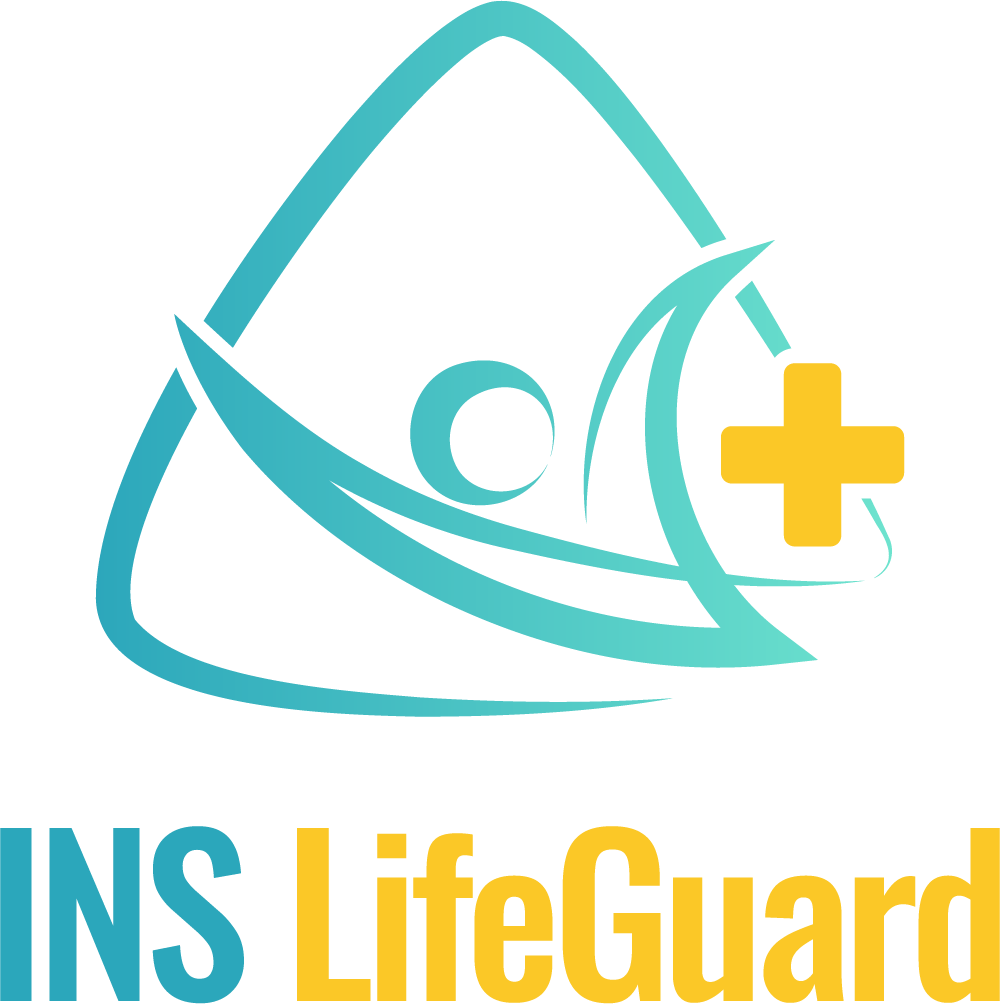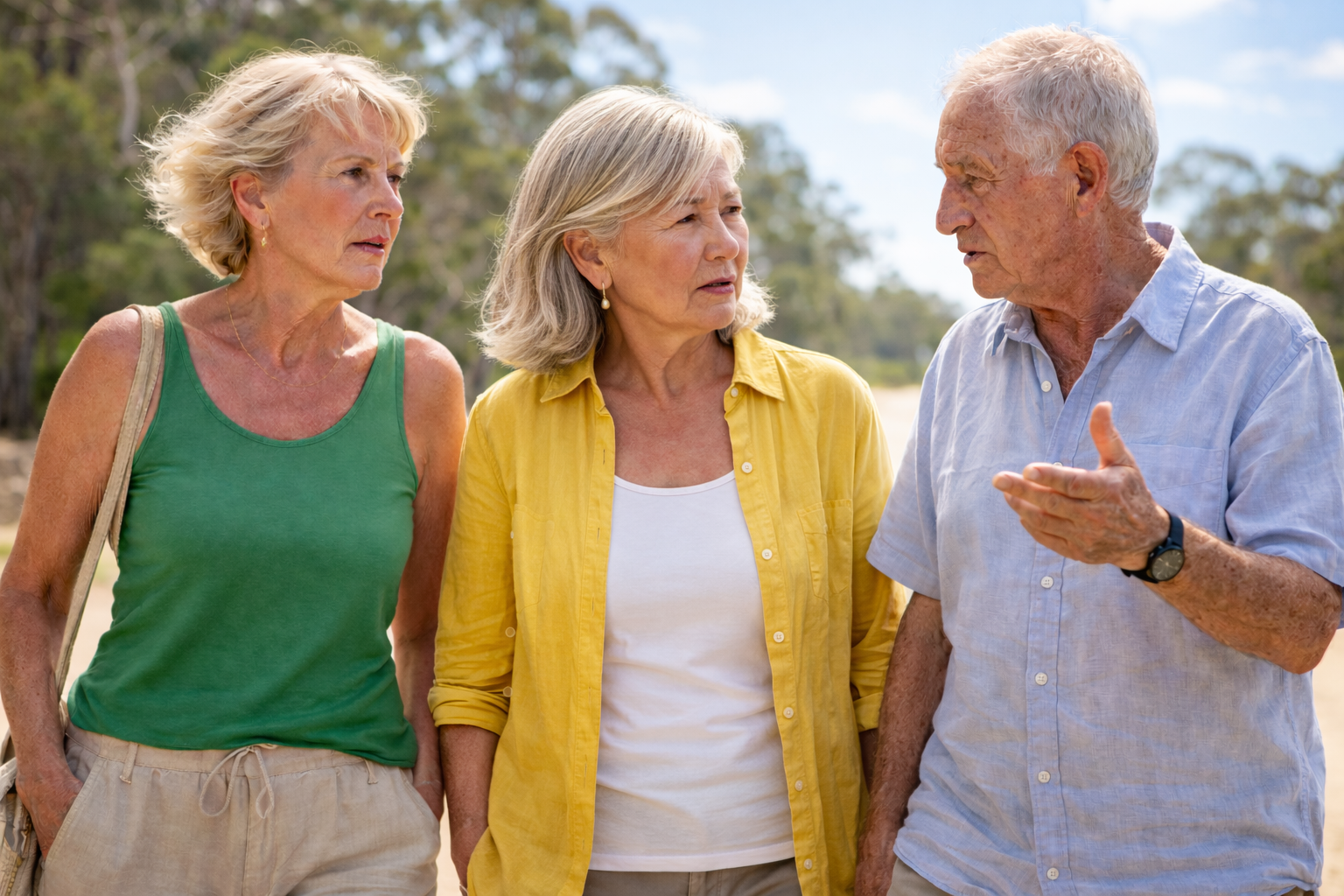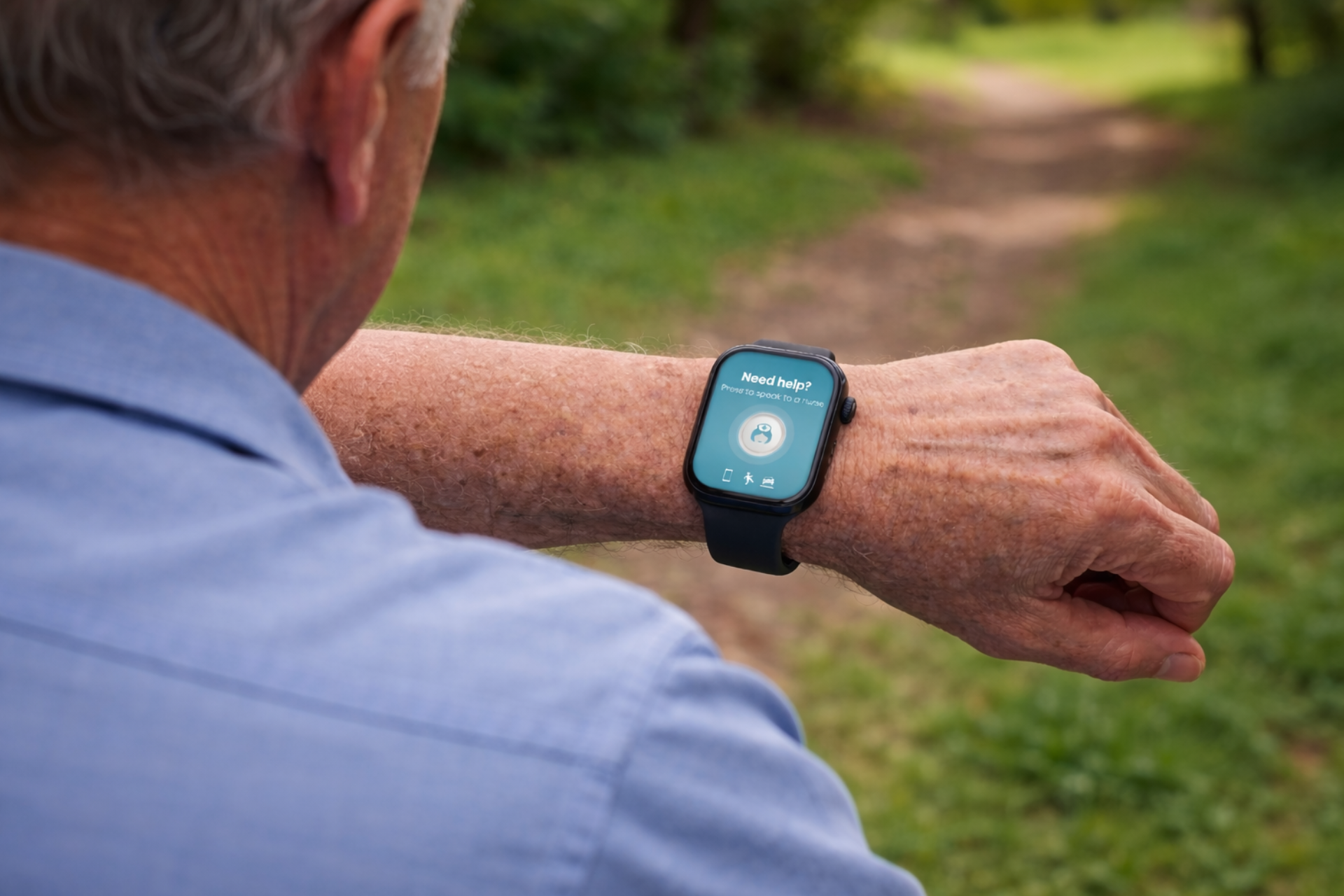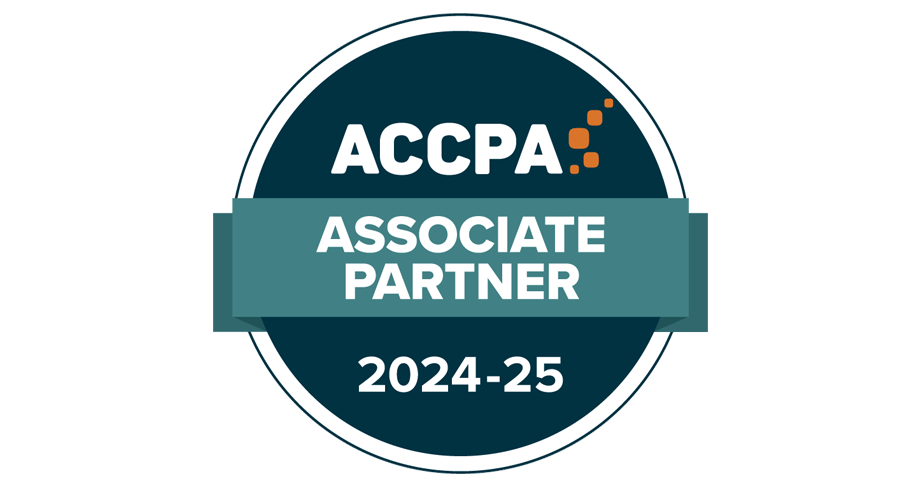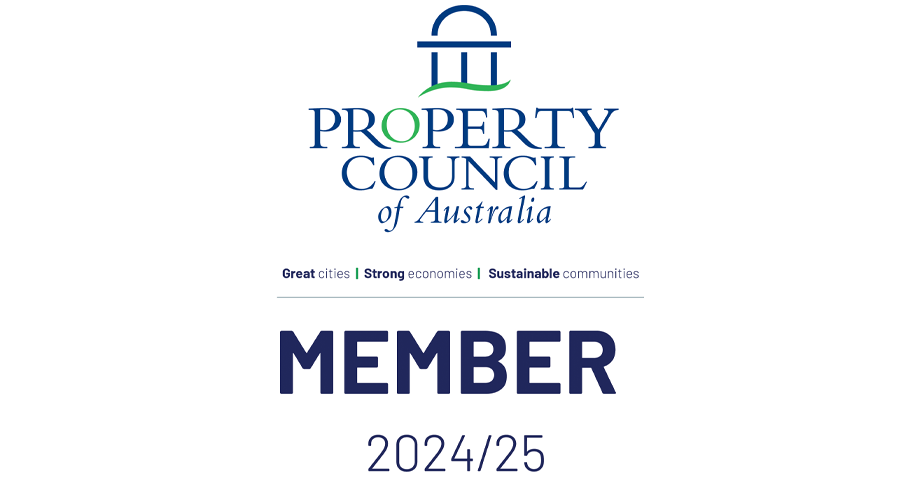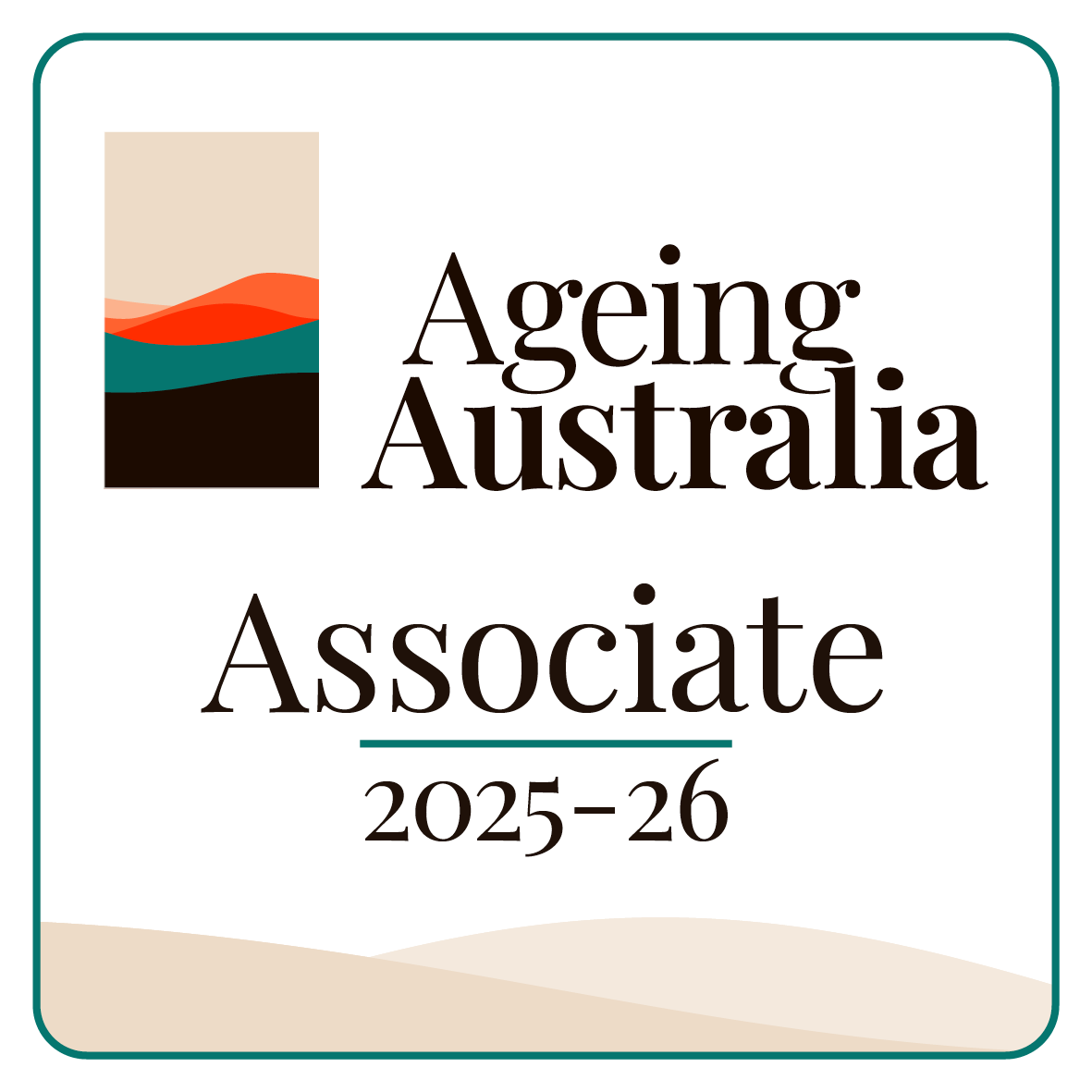Have a Question?
Unveiling the Most Common Health and Age-Related Conditions: Insights and Strategies for Well-being

Ageing is a natural process that brings with it a wealth of experience and cherished moments. However, it also brings about certain hurdles that require empathy, patience and support. As individuals grow older, they often face many challenges that can span from physical limitations to changes in cognitive abilities. These challenges can make once-simple tasks more demanding, including issues like joint discomfort, reduced muscle strength, and problems with maintaining balance.
One big concern among seniors is the increased risk of falling, especially for those who are dealing with pre-existing medical conditions. This factor contributes to 43% of hospitalisations due to injuries and 42% of injury deaths. Recognising and understanding these conditions is crucial for caregivers, healthcare professionals, and families to provide effective care, ensure safety, and enhance the overall quality of life for the elderly.
Below we explore the most prevailing health challenges among seniors in Australia.
Unveiling Common Health Challenges Among Seniors
As ageing progresses, certain conditions become more prevalent among the elderly population. These conditions can impact various aspects of their lives and well-being. So what are the most common age-related conditions in Australia?
| Type of Health Condition | Signs and Symptoms | Causes | Lifestyle Changes |
|---|---|---|---|
| Osteoporosis | Bone fractures, especially in the spine, hip, or wrist • Severe back pain • Loss of height • A curved, stooped posture | Inadequate calcium and vitamin D intake • Hormonal changes • Sedentary lifestyle • Other medical conditions | Participating in weight-bearing exercises such as walking • Balanced diet • Avoid smoking and alcohol • Calcium and vitamin D intake • Fall prevention measures |
| Cognitive Decline | Memory loss • Difficulty with problem-solving • Confusion • Mood/Personality changes • Repetitive behaviours | Increasing age • Genetic factors • Brain injuries or diseases • Vitamin B12 deficiency or other nutrient deficiencies • Unhealthy lifestyle | Healthy diet rich in fruits, vegetables, and omega-3 fatty acids • Regular physical and mental exercise • Social engagement and cognitive activities • Manage chronic conditions (e.g., diabetes, hypertension) |
| Chronic Pain | Persistent pain that lasts beyond normal healing time • Reduced mobility • Fatigue | Underlying medical conditions (e.g., arthritis, fibromyalgia) • Nerve damage • Injury or trauma • Inflammation | Pain management techniques (physical therapy, medication) • Stress management techniques (relaxation, meditation) • Regular low-impact exercise • Adequate sleep and balanced diet |
| Hearing Loss | Difficulty understanding speech • Asking for repetition • Increasing volume on devices • Ringing in the ears, known as tinnitus | Ageing and heredity • Damage to the inner ear • Loud noise exposure • Medical conditions (diabetes, ototoxic drugs) | Protect ears from loud noises • Regular hearing checkups • Use hearing aids if recommended • Communication strategies (face-to-face, clear speech) |
| Vision Impairment | Blurred or reduced vision • Difficulty seeing at night • Eye strain | Eye diseases (macular degeneration, cataracts, glaucoma) • Inherited conditions of blindness and vision impairment • Diabetes | Regular eye exams • Proper lighting • Use magnifying devices or glasses if needed • Healthy diet with antioxidants • Manage underlying medical conditions |
| Oral Health and Disease | Toothache • Gum disease • Bad breath • Tooth loss | Poor oral hygiene • Smoking tobacco • Sugar-rich diet • Genetics and ageing | Regular brushing and flossing • Routine dental checkups • Balanced diet low in sugary foods • Avoid smoking |
| Loneliness and Isolation | Feelings of emptiness • Lack of social connections • Depression | Loss of loved ones • Living alone • Health issues limiting social activities | Engage in social activities and clubs • Maintain relationships with family and friends • Volunteer or join community groups • Seek professional help if needed • Use technology to stay connected |
1. Osteoporosis
Osteoporosis is a medical condition characterised by the gradual weakening of bones, leading to a higher risk of fractures and breaks. It typically develops over time and is more common in older adults, especially women after menopause. The condition can affect any bone in the body, but fractures most commonly occur in the spine, hips, and wrists. These fractures can be a result of minimal trauma or even normal activities, such as bending, lifting, or falling.
2. Cognitive Decline
Cognitive decline refers to the gradual deterioration of cognitive functions such as memory, reasoning, attention, and problem-solving abilities. It is a normal part of ageing, but in some cases, it can progress to more severe conditions like mild cognitive impairment (MCI) or even dementia, such as Alzheimer's disease.
3. Chronic Pain
Chronic pain refers to persistent pain that lasts for an extended period, usually longer than three to six months, or beyond the normal healing time for an injury or illness. Unlike acute pain, which serves as a warning sign of injury or illness, chronic pain often persists even after the underlying cause has been treated or healed. It can stem from various underlying conditions, such as injuries, medical illnesses or nerve damage.
This type of pain can have a significant impact on person’s physical and emotional well-being, leading to reduced mobility, sleep disturbances and depression. Early diagnosis and appropriate treatment of medical illnesses, such as arthritis or neuropathy, can help manage chronic pain effectively.
4. Hearing Loss
Age-related hearing loss, also known as presbycusis, is a gradual and natural decline in hearing ability that occurs as people get older. It is one of the most common conditions affecting older adults. This type of condition can vary in severity from person to person.
The stigma associated with hearing aids and the lack of awareness about available solutions can prevent many seniors from seeking help. By fostering a culture of understanding, raising awareness, and promoting accessibility to hearing solutions, society can significantly improve the lives of seniors with hearing loss.
5. Vision Impairment
Conditions like cataracts, glaucoma, and age-related macular degeneration can significantly impact vision and independence. This can encompass a range of visual problems, including reduced visual sharpness, decreased contrast sensitivity, difficulty in distinguishing colours, and various eye conditions that become more common with ageing. Diminished eyesight can limit mobility, hinder daily tasks, and decrease overall quality of life.
6. Oral Health and Disease
Dental problems can lead to a host of issues, including difficulty eating, speaking, and even socialising. Seniors are more susceptible to certain oral health problems due to factors like reduced saliva production, chronic health issues, and medication use.
Maintaining good oral health practices, coupled with regular dental visits, can significantly reduce the risk of oral health issues and contribute to a healthier and more enjoyable life for seniors.
7. Loneliness and Isolation
This is a significant societal concern that can have profound negative impacts on their physical, mental, and emotional well-being. The absence of regular interactions and meaningful relationships can contribute to depression, anxiety, cognitive decline, and even physical health issues.
Offering access to mental health professionals or support groups specifically designed for seniors can provide a safe space for them to share their feelings and concerns. Regular phone calls, video chats, and in-person visits from family, friends, and neighbours can also provide meaningful interactions that combat loneliness.
This handy guide which is yours to
download for free.
Guide for Carers: Understanding and Supporting Seniors with Chronic Conditions

Top Chronic Health Issues Affecting Seniors in Australia
In Australia, just like in many parts of the world, seniors often face the uphill battle of chronic illnesses. An overwhelming 80% of Australians aged 65 and above experience at least one specific chronic health condition, while 28% contend with three or more of these conditions. These can significantly impact their well-being, making it essential for us to understand these problems, figure out how to manage them, and even prevent these illnesses as much as we can. Below will delve into their symptoms and explore effective strategies for prevention, offering valuable insights to enhance their quality of life.
What is a Chronic Condition?
A chronic condition, also referred to as a chronic illness or disease, is a medical condition that persists over an extended period of time, typically for three months or more. Unlike acute conditions, which often have a rapid onset and short duration, chronic conditions tend to develop slowly and may last for the rest of a person's life. These conditions can range from mild to severe and can impact various aspects of a person's health.
| Chronic Health Problems | Signs and Symptoms | Causes | Lifestyle Changes |
|---|---|---|---|
| Cardiovascular Diseases | Chest pain and discomfort • Shortness of breath • Fatigue and weakness • Irregular heartbeat | High blood pressure • High cholesterol levels • Diabetes • Smoking and tobacco use | Get regular health screenings • Manage stress • Get good quality of sleep • Eat a heart-healthy diet Quit smoking Gentle exercise |
| Arthritis and other musculoskeletal conditions | Joint pain and stiffness • Swelling and tenderness in affected joints • Reduced range of motion • Muscle weakness and fatigue • Balance and coordination issues • Increased susceptibility to fractures and falls • Chronic pain, particularly in the back and joints | Bone fractures • Joint dislocation • Poor posture • Sprains • Autoimmune disease • Genetic factors | Maintain a healthy weight • Control blood sugar • Regular check-ups • Consume a diet rich in fruits, vegetables, whole grains, lean proteins, and healthy fats • Engage in low-impact exercises |
| Chronic Kidney Disease | Dry and itchy skin • A need to pee more often • Foamy urine, or difficulty urinating • Fluid retention and swelling • Fatigue and weakness • Poor appetite • Trouble concentrating | High blood pressure • Diabetes • Family history of kidney failure • Chronic infections • Unhealthy habits • Prolonged use of certain medications | Stay hydrated • Medication management • Quit smoking and limit alcohol • Limit salt, potassium, and phosphorus intake |
| Respiratory Conditions | Wheezing Coughing • Tightness in the chest • Shortness of breath • Increased mucus production | Fluid in your lungs • Nerve and muscle disorders • Long-term exposure to air pollutants • Smoking • Using drugs or alcohol | Maintain a healthy weight • Undergo regular screenings • Maintaining a clean and well-ventilated living environment • Avoid unhealthy habits • Get vaccinated against respiratory infections |
| Dementia | Memory loss • Disorientation and confusion • Impaired communication and language • Mood and behavioural changes • Difficulty with coordination and motor skills | Age and genetics • Damage to brain cells • Parkinson's disease • Alzheimer's Disease | Balanced diet • Engaging in mentally stimulating activities • Prioritise a regular sleep schedule • Cognitive therapy • Medication management |
| Diabetes | Frequent urination and increased thirst • Extreme hunger and weight change • Fatigue and weakness • Blurred vision • Cuts and sores may take longer to heal | Insulin resistance • Autoimmune disease • Pancreatic damage • Genetic factors • Obesity • Poor Diet • Sedentary Lifestyle | Monitor blood sugar levels regularly • Stay well-hydrated • Weight management • Healthy diet with controlled carbohydrates |
1. Cardiovascular Diseases
Cardiovascular diseases are like silent intruders that can affect the heart and blood vessels, posing a significant threat to the well-being of the elderly population. Conditions like coronary artery disease, heart failure, arrhythmias, and valvular heart disease are part of this group.
2. Arthritis and Other Musculoskeletal Conditions
Arthritis refers to a group of conditions that involve inflammation of the joints, leading to pain, swelling, and stiffness. The most common types of arthritis seen in elderly individuals include Osteoarthritis, Rheumatoid Arthritis, Gout and other musculoskeletal conditions.
3. Chronic Kidney Disease
This is a medical condition characterised by the gradual and long-term deterioration of kidney function over time. The kidneys play a crucial role in filtering waste products, excess fluids, and electrolytes from the blood, helping to maintain a stable balance of fluids and chemicals in the body. When the kidneys' ability to perform these functions becomes impaired and the damage is persistent, it leads to CKD.
4. Respiratory Conditions
Respiratory conditions, also known as respiratory diseases or disorders, are medical conditions that affect the organs and structures involved in the process of breathing and oxygen exchange in the body. These can range from mild and temporary issues to severe and chronic diseases like chronic obstructive pulmonary disease (COPD), pneumonia, and asthma can make every breath a challenge for the elderly.
These conditions can limit daily activities that may lead to isolation.
5. Dementia
Dementia is a complex and often heartbreaking condition that casts a profound impact on individuals, families, and communities. It is an umbrella term for a group of cognitive disorders and primarily affects memory and cognitive functions, it can also lead to emotional and psychological challenges.
Dementia is a progressive condition and symptoms tend to worsen over time. Early diagnosis and appropriate management can help improve the quality of life for individuals with dementia and their caregivers.
6. Diabetes
Diabetes, also known as diabetes mellitus, is a chronic medical condition that occurs when the body is unable to properly regulate blood sugar (glucose) levels. Glucose is a type of sugar that serves as the primary source of energy for the body's cells. To maintain stable blood sugar levels, the hormone insulin is essential. Insulin is produced by the pancreas, an organ located behind the stomach.
There are three main types of diabetes:
Type 1 Diabetes: This is an autoimmune condition in which the immune system mistakenly attacks and destroys the insulin-producing cells in the pancreas.
Type 2 Diabetes: This form of diabetes is characterised by the body's reduced ability to respond to insulin (insulin resistance) and a gradual decline in insulin production over time.
Gestational Diabetes: This type of diabetes occurs during pregnancy when the body is unable to produce enough insulin to meet the increased demands.
This handy guide which is yours to
download for free.
Guide for Carers: Understanding and Supporting Seniors with Chronic Conditions
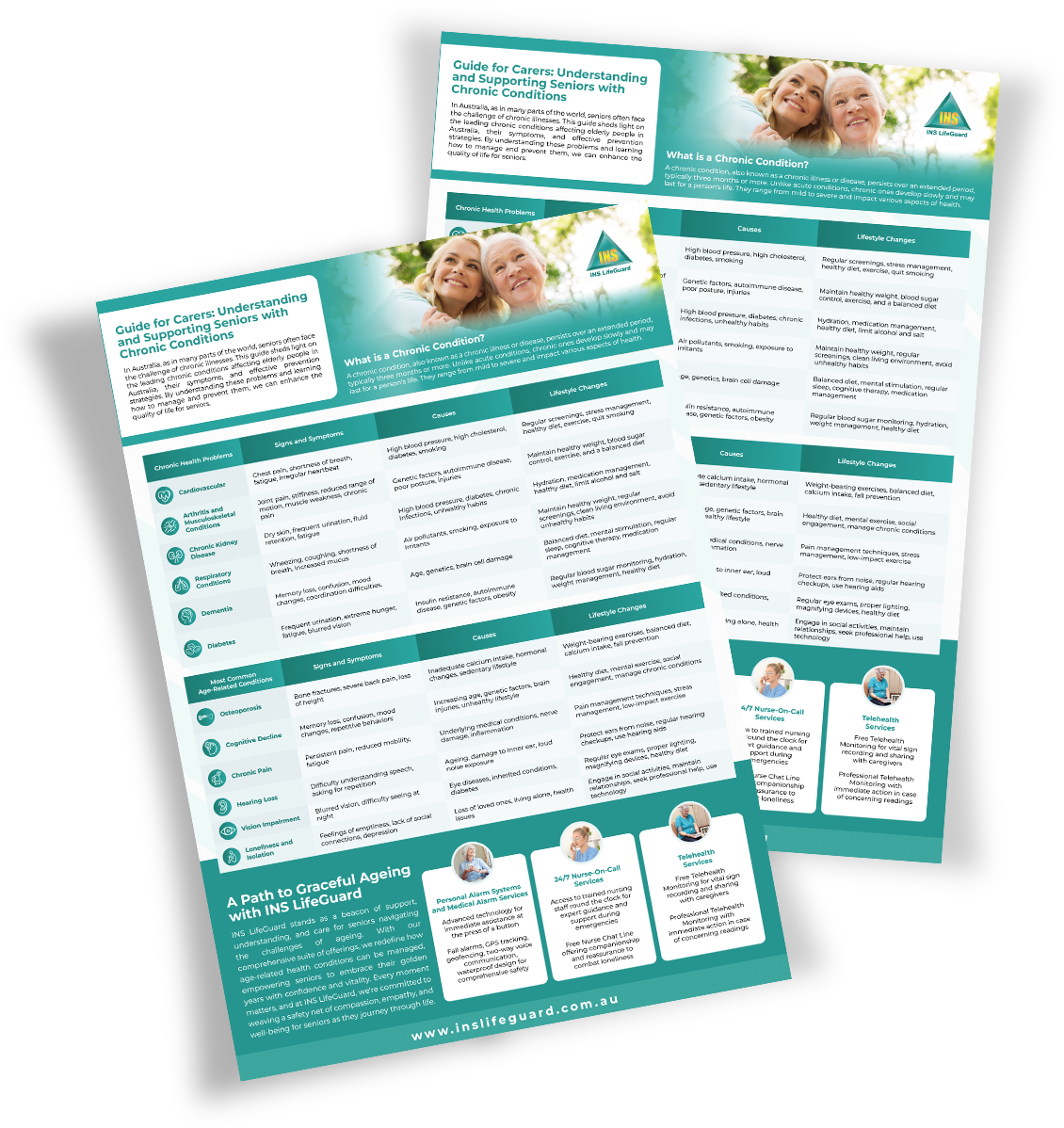
How INS LifeGuard Can Help
Living with chronic illnesses or conditions can impose a significant toll on a person's physical, emotional, and mental well-being. The daily routines of medication management, doctor appointments, and symptom monitoring can quickly become overwhelming, leading to feelings of isolation and stress, particularly for those without close familial support. INS LifeGuard steps in as a reliable companion, offering a range of invaluable services that cater to the unique needs of each individual.
At the core of our mission lies the commitment to empowering seniors. Through our comprehensive suite of offerings, these innovative products and services become an essential partner in promoting safety independence.
Personal Alarm Systems and Medical Alarm Services
for in Home and Away
INS LifeGuard's cutting-edge personal and medical alarm systems are equipped with advanced technology to ensure immediate assistance at the press of a button. Whether it's a sudden heart concern, a fall, or any other medical emergency, seniors can rest assured that help is just a touch away. This quick response minimises the impact of potential health crises and ensures that seniors receive timely medical attention.
| Features | Description |
|---|---|
| Cardiovascular Diseases | Equipped with sensors to detect sudden falls, triggering automatic alerts to emergency responders and caregivers. |
| GPS Tracking | Utilises GPS technology to accurately pinpoint the location of the individual requesting assistance, aiding quick response and intervention. |
| Geofencing Capabilities | Offers geofencing functionality, especially beneficial for tracking individuals with dementia or Alzheimer's who might wander outside safe zones. |
| Two-Way Voice Communication | Enables real-time communication between the user and our emergency response team, allowing for clearer instructions, reassurance, and coordination. |
| HELP Button | Provides quick response at the press of a button, ensuring timely medical attention, especially for seniors. |
| Waterproof and Durable Design | Resistant to water and wear, suitable for constant wear and various daily activities. |
24/7 Nurse-On-Call Services
Emergency Response
Exclusive service providing access to highly trained nursing staff available around the clock. In critical situations, our highly trained nurses can provide not only personal details but also essential medical information that could potentially save a life. They provide health information, expert guidance and support during medical emergencies, security threats, and other critical scenarios, providing seniors with the assurance that they are in capable hands.
How it Works?
- In case of an emergency, seniors can simply press the button on their personal alarm. For added security, it features a fall sensor that automatically raises an alarm if no movement is detected after a fall. Our wearable transmitters are user-friendly and usable even in the shower.
- Once triggered, an alert is immediately sent to a nurse at our emergency response centre. This nurse has access to your medical history and personal information. Using the two-way speaker on your emergency unit, the nurse will communicate with you, even if you're not right next to the unit.
- After assessing the situation, the nurse will arrange appropriate assistance. This could involve reaching out to your emergency contacts, such as family, neighbours, or friends. In more serious situations, emergency services will be contacted.
- If the nurse can't establish voice communication, an ambulance will be dispatched to your location. Regardless of the circumstances, be assured that help is coming.
- Our TeleHealth products and services can help you take care of your health while you're at home. For older people, you can easily check your heart rate and blood pressure, and then share this information with your family or a caregiver. Trained nurses from INS LifeGuard can also keep an eye on your health. If they notice something wrong, they will help you and even call for help if there's an emergency
Free Nurse Chat and Health Info Line
Prevention is a big part of what we do. We firmly believe that the most effective way to ensure safety is to prevent emergencies and risks from occurring in the first place. Through the deployment of highly experienced nurses at our Emergency Response Centre, we are able to provide support even before a situation escalates to an emergency.
- Feeling lonely? Reach out to the INS nurse anytime you want someone to talk to. Whether it's the middle of the day or night, a caring and compassionate voice is just a call away. We are here to lend an ear and make you feel heard.
- Need information or support? If you have questions or require assistance, you can rely on us for accurate information and the support you need. Whether it's about health concerns or just a general query, we are ready to help you.
- We also offer requested welfare checks on behalf of carers and families. If you're concerned about a loved one, you can request a welfare check to make sure they're doing alright. It's a way to show your care and ensure their safety.
Telehealth Services
Empathy and compassion are the foundations of our approach to healthcare.
Free Telehealth Monitoring
Clients can conveniently record vital signs (heart rate, blood pressure, temperature, etc.) from their homes. The recorded data is shared with family members or caregivers, creating a support network. This service enhances patients' sense of security and provides insights into their health journey.
Professional Telehealth Monitoring
A comprehensive telehealth option. Recorded vital signs are transmitted to a team of registered nurses who monitor and analyse trends. If concerning readings arise, experienced nurses take immediate action, contacting both the patient and their healthcare team. This proactive approach prevents health complications from escalating.
Preventive Approach
Highly experienced nurses at our Emergency Response Centre are available 24/7 to provide support before emergencies escalate. Welfare Checks for safety and well-being can also be scheduled.
Takeaway
Challenges associated with managing conditions can be overwhelming, often requiring continuous monitoring, medication adherence, and lifestyle adjustments. In recognition of these difficulties, INS LifeGuard steps in as a supportive safety net, by combining advanced technology, personalised care, and a compassionate support system.
Because every life is precious, and every moment matters – we're building a community dedicated to the safety, health, and happiness of our seniors. With INS LifeGuard, seniors can embrace your golden years with confidence, vitality, and a renewed sense of independence.
To learn more about the products and services we offer, you can
browse our website or call us on
1800 636 040 and we'll be happy to assist you with your needs.

About
INS LifeGuard is the only 24/7 nurse on-call personal and medical monitoring in Australia. We provide monitoring technology for both in the home and on the go and can also monitor other provider's equipment. Our services are suitable for anyone wanting support to stay independent such as the elderly, those with medical conditions and disabilities plus enhancing safety and security for lone workers.
